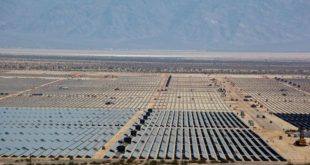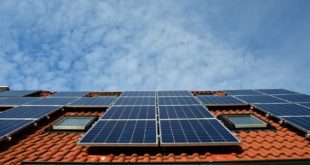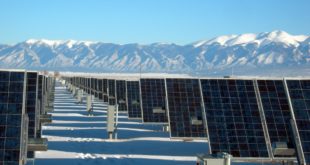Department of Energy Awards More Than $145 Million for Advanced Solar Technologies
DOE SunShot Initiative Accelerates Development of Cost-Competitive Solar Technologies
WASHINGTON, D.C. – Energy Secretary Steven Chu today announced more than $145 million for projects to help shape the next generation of solar energy technologies and ensure that the United States remains a leader in this global market. Sixty-nine projects in 24 states will accelerate research and development to increase efficiency, lower costs and advance cutting-edge technologies. Funded through DOE’s Office of Energy Efficiency and Renewable Energy, the projects will also improve materials, manufacturing processes and supply chains for a wide range of photovoltaic (PV) solar cells and components of solar energy systems. Some of these investments also support efforts that will shorten the overall timeline from prototype to production and streamline building codes, zoning laws, permitting rules, and business processes for installing solar energy systems.
“America is in a world race to produce cost-competitive renewable energy that can reduce our reliance on fossil fuels, create manufacturing jobs across the nation, and improve our energy security,” said Secretary Chu. “The projects announced today under DOE’s SunShot Initiative will spur American innovation to help reduce the costs of clean, renewable solar energy and re-establish U.S. global leadership in this fast growing industry.”
The SunShot Initiative seeks to make solar energy systems more cost-competitive, without long-term subsidies, by reducing the cost of these systems about 75 percent by the end of the decade. The achievement of the SunShot Initiative goals will encourage rapid, widespread adoption of solar energy systems across the United States.
SunShot is driving innovation in the way solar energy systems are conceived, designed, manufactured, and installed. The awards announced today will target improvements across the research, development, and demonstration pipeline, from next generation technologies 7-10 years away from commercial readiness, to scientific and technological improvements which can be rapidly implemented within 5 years. The programs will create entirely new and more economical approaches to collecting solar energy and tackle fundamental challenges to ramp up use of these renewable energy technologies.
The six categories of projects announced today are:
* Extreme Balance of System Hardware Cost Reductions – Nine projects to receive $42 million.
These projects will conduct research and development of new balance of system (BOS) hardware, or solar system components including power inverters and mounting racks but excluding solar panels or cells, that is inexpensive, safe, and highly reliable. BOS accounts for more than 40 percent of the total installed cost of solar energy systems and represents a major opportunity to achieve significant cost reductions.
* Foundational Program to Advance Cell Efficiency – Eighteen projects to receive $35.8 million.
Combining both the technical and funding resources of U.S. Department of Energy and the National Science Foundation, this joint program will support research that aims to eliminate the significant gap between the efficiencies of prototype cells achieved in the laboratory and the efficiencies of cells produced on manufacturing lines. The projects under this award address cost and efficiency barriers, advance fundamental PV cell research, and develop materials and processes for more efficient, cost-effective photovoltaic cells.
* Solar Energy Grid Integration Systems: Advanced Concepts – Eight projects to receive $25.9 million.
These projects will develop electronics and build smarter, more interactive systems and components so that solar energy can be integrated into the electric power distribution and transmission grid at higher levels. These technologies will help advance a smart grid that will handle two-way flows of power and communication, in contrast to the one-way power flow and limited communication that exists today.
* Transformational PV Science and Technology: Next Generation Photovoltaics II – Twenty-three projects to receive $22.2 million.
These awards will fund applied research into technologies that greatly increase efficiency, lower costs, create secure and sustainable supply chains and perform more reliably than the current PV technologies. Investing in new classes of photovoltaic technology feeds the industry with the new innovations it will need to compete in the future and will help achieve the goals of the Sunshot Initiative.
* Reducing Market Barriers and Non-Hardware Balance of System Costs – Seven projects to receive $13.6 million.
These awards will provide funding to create tools and develop methods to reduce the cost of non-hardware components for installed solar energy systems. These projects will develop software design tools and databases that can be used by local jurisdictions and installers, and tools to streamline building codes, zoning laws, permitting rules, and business processes for installing solar systems.
* SunShot Incubator – Four projects to receive $5.8 million.
These projects will fund two different tiers of transformational projects. The first accelerates development of new technologies from concept to commercial viability. The second level of funding supports efforts that shorten the overall timeline from laboratory scale development to pilot line manufacture. The SunShot Incubator Program is an expansion of DOE’s successful PV Technology Incubator Program, launched in 2007, which to date has funded $60 million in projects that have been leveraged into $1.3 billion in private investment.
For a full list of award by project category, visit HERE.
For a full list of awards by state, visit HERE.
DOE’s Office of Energy Efficiency and Renewable Energy invests in clean energy technologies that strengthen the economy, protect the environment, and reduce America’s dependence on foreign oil. Learn more about the SunShot Initiative and DOE’s efforts to expand safe, readily available, and inexpensive solar energy across the nation by the end of the decade.
 Alternative Energy HQ solar power for homes, wind energy, and bio fuel issues
Alternative Energy HQ solar power for homes, wind energy, and bio fuel issues





